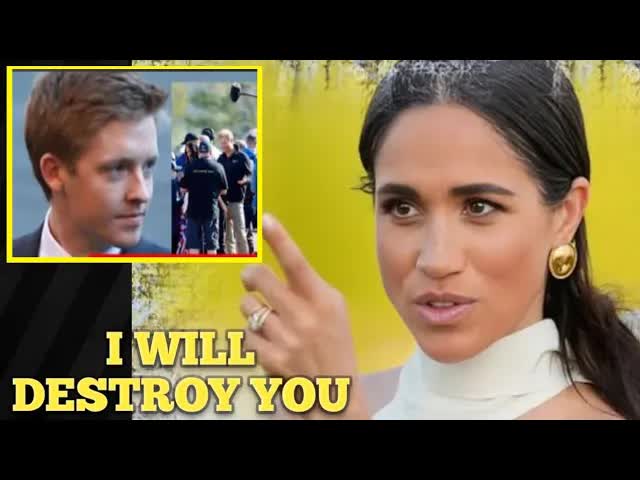The News
Duke of Westminster’s Blacklist: A Royal Rift with Prince Harry and Meghan Markle
Recently, the Duke of Westminster found himself at the heart of a brewing storm involving Prince Harry and Meghan Markle.
What started as a simple request from Meghan quickly escalated into a controversy that has sent ripples through British high society.
The Duchess of Sussex sought permission to have a Netflix camera crew accompany her to a charity gala hosted by the Duke, an event traditionally designed for low-key mingling among attendees focused on charitable causes.
The Duke, known for his discretion and commitment to preserving the privacy of his events, was taken aback by Meghan's request.
He understood the potential for publicity but also recognized the importance of maintaining a respectful atmosphere at his gathering.
This charity gala was meant to be a celebration of giving, not a spectacle for reality television.
As news of Meghan's request spread, it ignited a flurry of reactions online, with opinions sharply divided.
Social media exploded with commentary; some supported the couple's desire to document their lives, while others criticized them for what they deemed an invasion of the event's sanctity.
The Duke found himself in a precarious situation, having always championed charitable causes yet now facing the challenge of protecting the integrity of his event.
After careful consideration, he decided to decline Meghan's request, firmly stating that the gala would remain free from the glare of cameras.
This refusal reportedly left Meghan frustrated.
She believed that the exposure could significantly enhance the charity's visibility and mission.
However, the Duke remained resolute, emphasizing that the event's integrity must take precedence.
This decision sparked conversations within aristocratic circles about the Sussexes' standing among their peers.
Once welcomed with open arms, Harry and Meghan now seemed to stir controversy within traditional elite society.
As whispers began to circulate that the Duke had unofficially blacklisted the couple from future events, the implications of this decision became increasingly apparent.
Invitations to exclusive gatherings are highly coveted in British high society, and the absence of the Sussexes would undoubtedly be felt.
Many began to wonder if this marked a turning point for the couple, a moment that could redefine their place in British society.
In response to the growing narrative, Prince Harry and Meghan released a statement reaffirming their dedication to charitable work and the need for transparency.
They argued that media attention could help garner support for their causes.
Yet, this justification did little to quell the rising tide of criticism.
Detractors claimed that their pursuit of publicity overshadowed the very missions they claimed to support.
The media, ever eager for a sensational story, framed this unfolding drama as a clash between traditional aristocracy and modern celebrity culture.
Meanwhile, the Duke of Westminster remained steadfast in his stance.
Behind closed doors, discussions intensified among other members of the elite, who began to reevaluate their relationships with the Sussexes.
Would associating with a couple perceived to disregard social traditions lead to backlash?
As invitations dwindled, the couple found themselves increasingly isolated from gatherings that had once embraced them.
Simultaneously, their Netflix documentary project continued to develop, with Meghan's insistence on filming aspects of their lives becoming a contentious issue.
While the couple believed they were sharing their story and inspiring others, the aristocracy painted them as out-of-touch celebrities more interested in fame than philanthropy.
The Duke's decision became emblematic of resistance against the merging of celebrity culture with traditional values.
Many in the aristocracy supported him, fearing that the integrity of their gatherings was at stake.
Conversely, a counter-narrative emerged that celebrated Harry and Meghan's right to tell their story and highlighted the importance of their charitable work.
This division underscored the shifting landscape of British society, where the lines between traditional nobility and modern public service were beginning to blur.
As the media continued to sensationalize the story, the real impact was felt in quieter conversations among friends and family.
The Duke's actions sparked debates over dinner tables about the monarchy's role in contemporary life, the influence of celebrity, and public figures' responsibilities.
It forced many to confront their views on privacy, publicity, and the evolving nature of charity in the 21st century.
Weeks turned into months, and the Duke's blacklist became a symbol of a broader cultural clash between modernity and tradition.
The couple faced increasing scrutiny and began to reassess their approach.
Would they continue to seek recognition in a space that seemed to reject them?
Or would they adapt to this new reality without sacrificing their ideals?
The Duke's firm stance set the stage for a pivotal moment, one that could redefine the couple's future within the intricate tapestry of British society.
This ongoing saga has captivated audiences far and wide, drawing in not only royal watchers but also those intrigued by the complexities of human relationships and societal expectations.
As this story unfolds, many are left pondering what lies ahead for both the Duke of Westminster and the Duke and Duchess of Sussex.
Will reconciliation be possible, or is this the start of a deeper separation between the couple and the world they once inhabited?
The answers remain elusive, but one thing is certain: the intersection of royalty and celebrity will continue to ignite discussion and debate for years to come.






























































